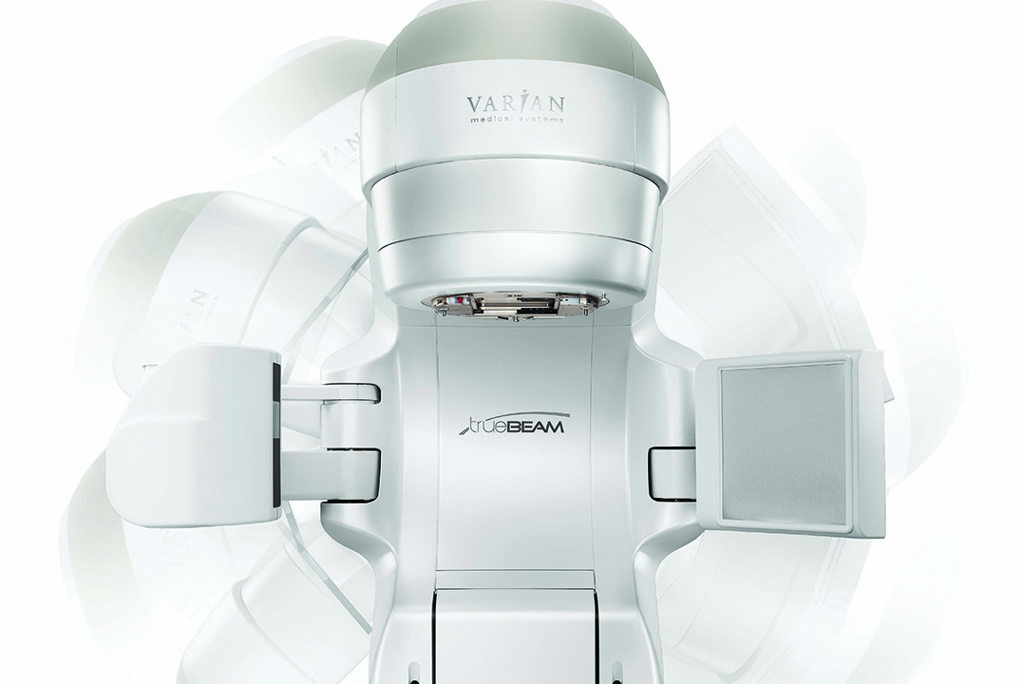
Harnessing Energy to Treat Cancer
Radiation Oncology
Radiation therapy, also called radiation oncology, is the use of high-dose radiation to treat cancer. It’s one of the most common types of cancer treatment with more than half of cancer patients having some form of radiation therapy as part of their treatment plan.
Radiation therapy is often used to shrink a cancer tumor prior to surgery. Radiation therapy also can be used to even cure a very early-stage tumor. Radiation therapy may be the only treatment needed or it may be used along with surgery chemotherapy, or a combination. Other times, radiation therapy is used to slow a cancer’s growth rather than shrinking it.
At Penn Highlands Healthcare, our expert radiation oncology team offers several kinds of radiation therapy, including image-guided radiotherapy, stereotactic radiosurgery, and volumetric-modulated arc therapy. That means you won’t need to travel outside Central Pennsylvania to find the latest radiation treatment for cancer.
Who Is on the Radiation Oncology Team?
Radiation oncologists are physicians who specialize in the treatment of cancer using controlled, high-dose radiation waves. Radiation therapy requires a team approach. At Penn Highlands, your radiation oncology team will consist of:
- A radiation oncologist, who will design your radiation treatment plan.
- A dosimetrist, whose job it is to calculate the amount of radiation you need each session and to set the system to deliver the right amount.
- Radiation therapists, who administer the radiation under the direction of the radiation oncologist.
- A medical physicist, who ensures the system is calibrated to deliver the correct amount of radiation.

Radiation Oncology
Hahne Cancer Center - State College
Penn Highlands Radiation Oncology - State College
A Service of Penn Highlands Huntingdon

Radiation Oncology
Penn Highlands Radiation Oncology - Mon Valley
A Service of Penn Highlands Connellsville
Hahne Cancer Center - Mon Valley

Radiation Oncology
Penn Highlands Radiation Oncology - Mon Valley
A Service of Penn Highlands Connellsville

Radiation Oncology
Hahne Cancer Center - State College
Penn Highlands Radiation Oncology - State College
A Service of Penn Highlands Huntingdon

Radiation Oncology
Penn Highlands Radiation Oncology - DuBois
A Service of Penn Highlands DuBois
Hahne Cancer Center - DuBois

Radiation Oncology
Penn Highlands Oncology/Hematology - St. Marys
A Service of Penn Highlands DuBois
Penn Highlands Oncology/Hematology - DuBois
A Service of Penn Highlands DuBois
Penn Highlands Oncology/Hematology - Clearfield
A Service of Penn Highlands DuBois
Penn Highlands Oncology/Hematology - Brookville
A Service of Penn Highlands DuBois
What types of radiation oncology treatments are offered at PHH?
At Penn Highlands, we offer many types of radiation oncology treatments to meet all of your cancer treatment needs, including the latest in external beam radiation therapy (EBRT). EBRT involves aiming a beam of radiation from outside the body at tumors inside the body. Below are the types of radiation oncology treatments we offer at Penn Highlands.
- Image-guided radiation therapy (IGRT) is the use of imaging—CT scan, MRI, or PET scan—during radiation therapy. This allows our radiation therapy team to determine the exact shape and location of cancer cells to improve accuracy of the treatment.
- Penn Highlands DuBois - TrueBeam IMRT system from Varian Medical Systems. It integrates new imaging and motion management technologies that make it possible to treat tumors located in the lung, breast, prostate, head, and neck, as well as others that are affected by body motions, such as breathing. TrueBeam’s dose delivery rates are 40 percent to 140 percent higher than previous technology. The system’s precision is measured in increments of less than a millimeter.
- Penn Highlands Mon Valley - Elekta Agility 160 Multileaf collimator (MLC) that utilizes industry-leading technology to provide faster more accurate and more versatile radiation therapy for individuals with cancer. XVI Symmetry-4D volume imaging of tumor motion immediately prior to treatment capturing image data during the breathing phase determining the position of the tumor for treatment.
- Three-dimensional conformal radiation therapy (3D-CRT) uses special computers to precisely map a tumor’s shape and location. Radiation beams are then shaped and aimed at the tumor from several directions as to avoid damaging surrounding normal tissue.
- Intensity-modulated radiation therapy (IMRT) is an advanced form of 3D-CRT. The intensity, or strength, of the beams can be adjusted to limit the amount of radiation exposure to normal tissue. IMRT is used when a tumor is near an important structure, such as the spinal cord. Volumetric-modulated arc therapy (VMAT) is a variation of IMRT that delivers radiation quickly over just a few minutes.
- Stereotactic body radiation therapy (SBRT) delivers a precisely targeted high dose of radiation to difficult-to-reach tumors involving the lungs, liver, pancreas, and spine. It is used as an alternative to surgery in some patients. Stereotactic radiosurgery (SRS) uses the same precise radiation as SBRT to treat tumors in the head and neck. It’s provided as an alternative to brain surgery or to shrink a tumor prior to brain surgery.
- Deep inspiration breath hold (DIBH), is a technique used in patients with left-sided breast cancer. It minimizes the amount of radiation dose to the heart, reducing the risk of future radiation-induced heart problems, such as coronary artery disease and heart attack.
-
Brachytherapy is a type of internal radiation that uses radiation to destroy cancer cells and shrink tumors. PH Mon Valley offers both Low Dose and High Dose Brachytherapy:
Low dose brachytherapy is used for men diagnosed with prostate cancer. Tiny radioactive seeds are permanently implanted into the prostate gland emitting low doses of radiation internally over a few months.
High dose brachytherapy is a temporary type of internal radiation therapy and can be used to treat various types of cancers such as: Prostate, cervical, endometrial, breast, lung, and skin.
Highly radioactive material travels inside the body through a tube or a catheter emitting radiation to the tumor. Once the dose is delivered the material is retracted and the patient can go home non-radioactive.
How Is Radiation Therapy Delivered?
Radiation therapy requires precise planning and collaboration by your entire radiotherapy team. Prior to your first treatment, you will meet with your Penn Highlands radiation therapy team for treatment planning, also called a simulation appointment. This important session provides the radiation oncologist, physicist, and dosimetrist the information they need to ensure the safe and accurate delivery of your radiation therapy. This appointment takes about an hour.
After your therapy is mapped out, you’ll begin treatments, which are administered by a radiation therapist under the direction of your radiation oncologist. You’ll likely receive radiation therapy five days a week for two to seven weeks. Each session lasts only a few minutes, so your visits to the cancer center will be brief.
Hahne Cancer Center is the premier cancer care provider for the region. The physicians who plan and order radiation therapy treatments are called radiation oncologists, and at Hahne Regional Cancer Center, the radiation oncologist and his team make up the Radiation Oncology Department.
- Chemotherapy
- Hematology
- Immunotherapy
- Medical Oncology
- Radiation Oncology
Penn Highlands Hahne Cancer Center is the premier cancer care provider for the region. Established in Monongahela in 1985 at Penn Highlands Mon Valley.
- Biologic Therapy
- Chemotherapy
- Hematology
- Hormone Therapy
- Immunotherapy
- Medical Oncology
- Radiation Oncology
-
Clinical Trials
Radiation Oncology is provided in the serene surrounding at the Hahne Cancer Center at Penn Highlands State College.
- Chemotherapy
- Hematology
- Immunotherapy
- Medical Oncology
- Radiation Oncology
Breath Hold
Breath Hold is for patients with left-sided breast cancers. Not all patients benefit from breath hold, but all left breast patients are evaluated to see if they would benefit. For about two out of three patients, breath hold will reduce the radiation dose to the heart and may decrease the risk of future radiation-induced heart problems, such as coronary artery disease and heart attacks.
Breath hold require patients to hold their breath for 20-25 seconds during radiation treatments. By holding a certain amount of air in the lungs, the heart is moved out of the path of the radiation beam.
To do this accurately, patients have a small optical sensor placed on their chest while lying on the treatment table. A computer tracks the position of this sensor. The machine will not deliver any radiation unless the chest is in the right position.


